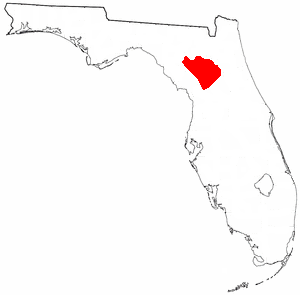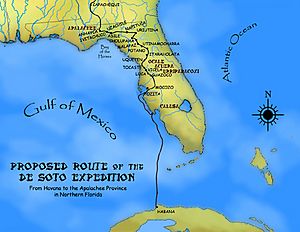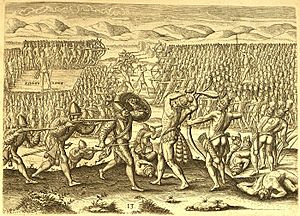Potano facts for kids

Approximate area occupied by the Potano tribe at the time of European contact
|
|
| Total population | |
|---|---|
| Extinct as a tribe | |
| Regions with significant populations | |
| United States (Florida) | |
| Languages | |
| Potano Timucua dialect | |
| Religion | |
| Native | |
| Related ethnic groups | |
| Timucua peoples |
The Potano (also called Potanou or Potavou) were a Native American tribe. They lived in north-central Florida when Europeans first arrived. Their land covered parts of what are now Alachua County, Marion County, and Putnam County. The Potano were part of the larger Timucua people and spoke a dialect of the Timucua language. Their culture, known as the Alachua culture, existed from about 700 AD to 1700 AD.
First Encounters with Europeans
The first Europeans to come near Potano land were part of the Pánfilo de Narváez expedition in 1528. While they did not meet the Potano directly, the Spanish explorers brought new diseases. These diseases and conflicts among tribes affected the area.
In 1539, Hernando de Soto led a large army through Potano territory. His army had 700 or more people. They forced villagers to give them stored food. De Soto's army moved quickly through Potano towns. Some of these towns were called Itaraholata, Potano, Utinamochana, Mala-paz, and Cholupa by the Spanish.
When the French built Fort Caroline, the Potano tribe was fighting with the Utina. The French helped the Utina defeat the Potano. After Spain took control of Florida from France, they also supported the Utina. In 1584, the Potano killed a Spanish captain. To punish them, a second Spanish group attacked. They killed many Potano people and forced others to leave their towns. After this attack, the town of Potano moved to a new spot near the Devil's Millhopper.
Spanish Missions and the Tribe's Decline
In the 1580s, Spanish Franciscan missionaries began visiting the Potano. A small mission outpost, called Apula, was set up in the town of Potano. However, it was destroyed during the Spanish attack in 1584 or 1585. More small outposts appeared in the 1590s.
In 1606, Spanish missionaries built a larger mission called Mission San Francisco de Potano. This was the first major mission west of the St. Johns River. Soon after, two more missions, San Miguel de Potano and Santa Ana de Potano, were built nearby. Another mission, San Buenaventura de Potano, was established around 1607. Missionaries reported that they had baptized over 1,000 adult Potano people by 1607. However, the San Miguel and San Buenaventura missions disappeared from Spanish records within a few years.
In 1656, the Potano joined other Timucuan tribes in a rebellion against the Spanish. The Spanish won after eight months of fighting. During the conflict, most Timucuan towns and missions were burned. After the rebellion, the Spanish rebuilt the Potano missions, San Francisco and Santa Ana.
In 1672, many Potano people died from a mysterious disease. In 1650, the Potano population was estimated to be around 3,000. By 1675, only 160 people were left at the two Potano missions.
After the Timucuan rebellion, the Spanish gave away much of the Potano's land to their colonists. This was because the Potano population had become very small. There were many Spanish cattle ranches in Timucuan territory, including some in Potano lands. The Potano often complained to Spanish officials that loose cattle were eating their crops.
By 1685, tribes from the north, often helped by English settlers from the Province of Carolina, began raiding Potano territory. They burned villages, killed Potano people, and took others away to be sold as slaves. These raids continued into the 1700s. The Spanish mission system in northern Florida collapsed after 1704. Some Potano survivors might have gone to the mission at St. Augustine as refugees. However, the Potano effectively became extinct as a tribe around that time.
 | Charles R. Drew |
 | Benjamin Banneker |
 | Jane C. Wright |
 | Roger Arliner Young |



